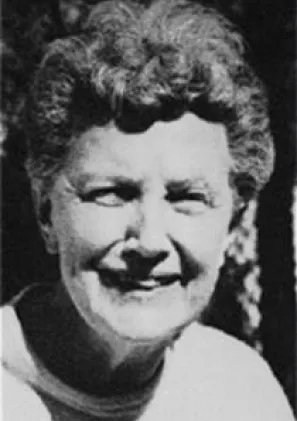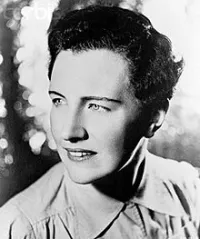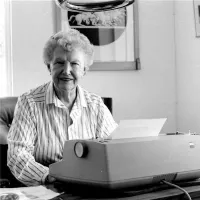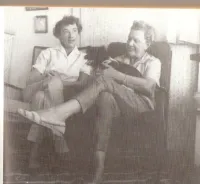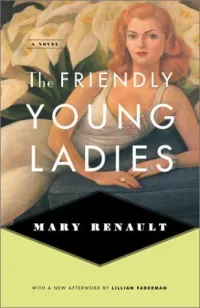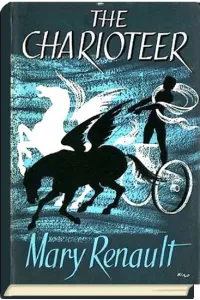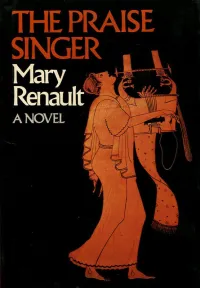Biography
1905 - 1983
“You can make an audience see nearly anything, if you yourself believe in it.”
– Mary Renault
Her father felt education was wasted on women — and her mother considered female students unfeminine — nonetheless, she earned two degrees at Oxford. In 1933 she met her life-partner of 48 years, a fellow nurse named Julie Mullard, while training at an infirmary. Renault's first novel, Purposes of Love, published to critical acclaim in 1939, explored the possibilities of same-sex love through an openly lesbian character named Colanna. Her novel The Charioteer (1953) —which dealt with the theme of love between men by evoking a soldier's attraction to a former classmate — was considered so provocative that six years passed before a publisher dared risk obscenity charges to release it in the U.S. The Persian Boy (1972) was a historical novel about the King Of Macedonia —Alexander the Great —told through the eyes of a beloved court eunuch, Bagoas. Renault's novels were critically acclaimed for their meticulously researched historical detail. But for gay readers they were also some of the only books of their time to present love between persons of the same gender not as a problem, but as a part of life. Before Renault died in 1983, she told her biographer she wanted to be remembered "as someone who got it right."
1905 - 1983
“You can make an audience see nearly anything, if you yourself believe in it.”
– Mary Renault
Her father felt education was wasted on women — and her mother considered female students unfeminine — nonetheless, she earned two degrees at Oxford. In 1933 she met her life-partner of 48 years, a fellow nurse named Julie Mullard, while training at an infirmary. Renault's first novel, Purposes of Love, published to critical acclaim in 1939, explored the possibilities of same-sex love through an openly lesbian character named Colanna. Her novel The Charioteer (1953) —which dealt with the theme of love between men by evoking a soldier's attraction to a former classmate — was considered so provocative that six years passed before a publisher dared risk obscenity charges to release it in the U.S. The Persian Boy (1972) was a historical novel about the King Of Macedonia —Alexander the Great —told through the eyes of a beloved court eunuch, Bagoas. Renault's novels were critically acclaimed for their meticulously researched historical detail. But for gay readers they were also some of the only books of their time to present love between persons of the same gender not as a problem, but as a part of life. Before Renault died in 1983, she told her biographer she wanted to be remembered "as someone who got it right."
Demography
Demography
Gender Female
Sexual Orientation Lesbian
Gender Identity Cisgender
Ethnicity Caucasian/White
Nations Affiliated South Africa United Kingdom
Era/Epoch Information Age (1970-present) Interwar Period (1918-1939) World War II (1939-1945)
Field(s) of Contribution
Author
Medicine
Demography
Gender Female
Sexual Orientation Lesbian
Gender Identity Cisgender
Ethnicity Caucasian/White
Nations Affiliated South Africa United Kingdom
Era/Epoch Information Age (1970-present) Interwar Period (1918-1939) World War II (1939-1945)
Field(s) of Contribution
Author
Medicine
Resources
Resources
Sweetman, David. Mary Renault: A Biography. Boston: Houghton Mifflin Harcourt, 1994.
https://en.wikipedia.org/wiki/Mary_Renault
https://www.questia.com/magazine/1G1-109270137/before-she-went-greek-novelist-mary-renault-threw
https://www.newyorker.com/magazine/2013/01/07/the-american-boy
https://glreview.org/article/mary-renault-as-the-first-gay-novelist/
Resources
Sweetman, David. Mary Renault: A Biography. Boston: Houghton Mifflin Harcourt, 1994.
https://en.wikipedia.org/wiki/Mary_Renault
https://www.questia.com/magazine/1G1-109270137/before-she-went-greek-novelist-mary-renault-threw
https://www.newyorker.com/magazine/2013/01/07/the-american-boy
https://glreview.org/article/mary-renault-as-the-first-gay-novelist/
